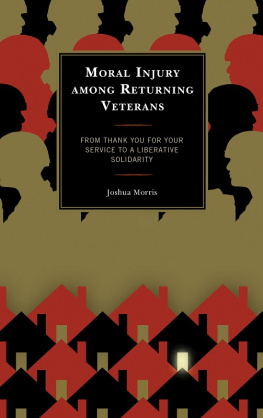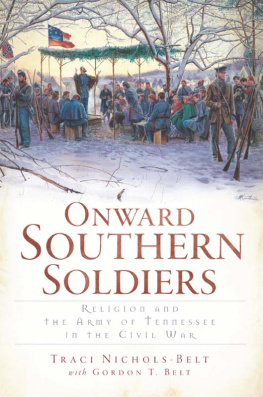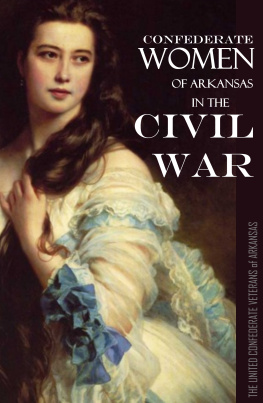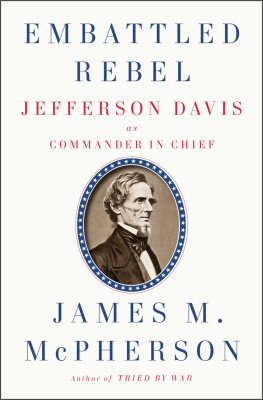Contents
Guide
Pagebreaks of the print version
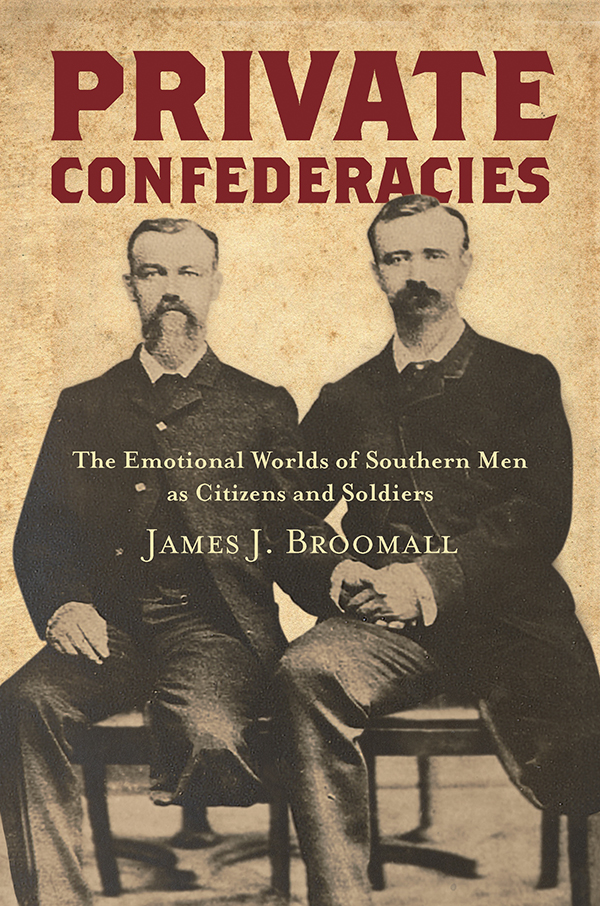
Private Confederacies
CIVIL WAR AMERICA
Peter S. Carmichael, Caroline E. Janney, and Aaron Sheehan-Dean, editors
This landmark series interprets broadly the history and culture of the Civil War era through the long nineteenth century and beyond. Drawing on diverse approaches and methods, the series publishes historical works that explore all aspects of the war, biographies of leading commanders, and tactical and campaign studies, along with select editions of primary sources. Together, these books shed new light on an era that remains central to our understanding of American and world history.
Private Confederacies
The Emotional Worlds of Southern Men as Citizens and Soldiers
James J. Broomall
University of North Carolina Press CHAPEL HILL
2019 The University of North Carolina Press
All rights reserved
Set in Merope Basic by Westchester Publishing Services
Manufactured in the United States of America
The University of North Carolina Press has been a member of the Green Press Initiative since 2003.
Library of Congress Cataloging-in-Publication Data
Names: Broomall, James J., author.
Title: Private confederacies : the emotional worlds of southern men as citizens and soldiers / James J. Broomall.
Other titles: Civil War America (Series)
Description: Chapel Hill : University of North Carolina Press, [2019] | Series: Civil War America | Includes bibliographical references and index.
Identifiers: LCCN 2018020212| ISBN 9781469649757 (cloth : alk. paper) | ISBN 9781469649764 (ebook)
Subjects: LCSH : MasculinitySouthern States19th centuryHistory. | MenSouthern StatesSocial life and customs19th century.
Classification: LCC BF 692.5 . B 755 2019 | DDC 155.3/32097509034dc23 LC record available at https://lccn.loc.gov/2018020212
Cover illustration: Detail from photograph of Henry J. Walker and Levi Jasper Walker, 1887. American Civil War Museum, under the management of Virginia Museum of History & Culture (FIC 2013.00272).
This book incorporates previously published material from We Are a Band of Brothers: Manhood and Community in Confederate Camps and Beyond, Civil War History 60, no. 3 (2014): 270309 (used here with the permission of Kent State University Press); and Personal Reconstructions: Southern Men as Soldiers and Citizens in the PostCivil War South, in Creating Citizenship in the Nineteenth-Century South , ed. William A. Link et al. (Gainesville: University Press of Florida, 2013), 11133 (used here with permission).
To Bill and Pete,
mentors, friends, and colleagues
Contents
Illustrations
Acknowledgments
As any author knows, a book is only possible because of other people. I have been incredibly fortunate in my professional and personal lives to be surrounded by supportive friends and family. Because of familys precedence in my life, I shall begin by acknowledging those closest and dearest to me. My parents have generously sacrificed vacations to accompany me on research trips, have kindly offered quiet spaces when I needed a place to write, and have supported my passion for history since I was a child. Their love provides me with a constant guide. During my first year in graduate school at the University of North Carolina, Greensboro, while pursuing a degree in museum studies, I met Tish Wiggs. Fifteen years and several states later, she remains my constant companion, my best friend, and my beloved wife. She and our beautiful children, Simon, Henry, and Addy are the most important people in my life. Tish and our children give me unparalleled joy and delayed the books completion in the most wonderful ways. My in-laws, Sefton and Cheryl, have always given us a warm home to visit and lavished me with support. Cheryl, in particular, has lent her considerable editorial talents to helping me polish and refine this project.
Good friends have provided support over the years and helped form many of the ideas underpinning this work during long, meandering conversations. I am happy to acknowledge them: Rob Burdick, Mike Clarke, Rich Condon, Troy Cool, Jeff Curry, Ernie Dollar, Mike Galloway, Chris Graham, Gary Keefer, John McMillan, Chris Meekins, Kevin Pawlak, Dana Shoaf, David Southern, Peter Thomas, Matt Williamson, and Steve Wismer. Through graduate school, academic conferences, and other venues, I have benefited from conversations with and the comments of Kevin Adams, Aaron Astor, Joe Beatty, Joel Black, Brian Bredehoeft, Andrew Canady, Catherine Clinton, Clay Cooper, Jason Daniels, Laura Davis, Angela Diaz, Adam Domby, Greg Downs, Angela Elder, Andrew Fialka, Katie Fialka, Jim Flook, Allison Fredette, Dennis Frye, Lesley Gordon, Matt Hall, Scott Huffard, Jim Knight, Peter Luebke, Jenn Lyon, Ben Miller, Steve Noll, Taylor Patterson, Jason Phillips, Chris Ruehlen, Dan Simone, Jay Smith, Roger Smith, Diane Sommerville, Dave Thomson, Ben Wise, and Angie Zombek. Sean Adams, Bill Blair, Matt Gallman, Jon Sensbach, and Sevan Terzian each read earlier iterations of this project from start to finish. Each of them therefore made an indelible mark on this bookmy sincerest thanks for taking the time to read my work and for caring enough to offer tough commentary. More recently, Aaron Sheehan-Dean read this project in its entirety and offered an extremely thoughtful and useful comment for which I am most grateful. At the University of North Carolina Press, first David Perry and, later, Mark Simpson-Vos shepherded me through the process of making my thoughts into this book project. Finally, I would like to acknowledge the anonymous readers from UNC Press. I spent a lot of time responding to the readers reports because they pushed me to write a better book. Thank you for the trenchant criticism and insightful commentary.
During a one-year teaching appointment at Virginia Tech, Mark Barrow, Joe Forte, Dennis Hidalgo, Marian Mollin, Matt Saionz, Dan Thorp, and Peter Wallenstein provided support and help when I needed it. Over the years, at sundry conferences or at my request, Paul Anderson, Joe Beilein, Stephen Berry, David Brown, Lisa Cardyn, Paul Cimbala, William Davis, Barb Gannon, Lorri Glover, Matt Hulbert, Brian Luskey, Jeff McClurken, Sarah Meacham, Megan Kate Nelson, Rachel Shelden, David Silkenat, Andy Slap, Trae Welborn, LeeAnn Whites, Tim Williams, and Michael Woods provided either formal or informal comments on this work that greatly advanced my thinking. Portions of this project have been presented before audiences at the Southern Historical Association, the Organization of American Historians, the American Historical Association, the University of Georgias Southern Roundtable Forum, the Symposium for the Civil War Sesquicentennial Committee of the North Carolina Department of Cultural Resources, the Conference of Florida Historians, the University of North Floridas Past to Present lecture series, Shepherd Universitys Research Faculty Forum, and various Civil War roundtablesthank you to these many audiences for their thoughtful suggestions.
I held my first tenure-track job at the University of North Florida. The department chair, Charles Closmann, provided a supportive environment and made sure I was not overwhelmed by committee work as a junior faculty member; additionally, office manager Marianne Roberts helped me with sundry tasks linked to this project. Greg Domber, David Sheffler, and Dan Watkins became good friends and intellectual companions during my time in Jacksonville. I presented portions of this project before members of UNFs History Department and acknowledge the helpful commentary of Denise Bossy, Alison Bruey, David Courtwright, Denice Fett, Chau Kelly, and Harry Rothschild. I have since moved to Shepherd University, where I serve in the History Department and act as director of the George Tyler Moore Center for the Study of the Civil War. Jennifer Alarcon, the centers program assistant, helped with the final stages of book production and always provided laughter when I needed it most. My colleagues Keith Alexander, Sally Brasher, David Gordon, Liz Perego, and Julia Sandy have made and make Shepherd an incredible home. My students in the Civil War and nineteenth-century America concentration have made teaching and mentoring an enjoyable, even joyful, experience. Our dean, Dow Benedict, is a model leader. And my colleague Ben Bankhurst makes life in Shepherdstown, West Virginia, fun, interesting, and intellectually stimulating.


